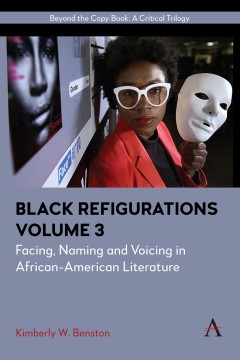Black Refigurations
Facing, Naming and Voicing in African-American Literature, Volume III
By Kimberly W. Benston
Other Formats Available:
E-Book- About This Book
- Reviews
- Author Information
- Series
- Table of Contents
- Links
- Podcasts
About This Book
Black Configurations is the first volume of a three-volume study that offers a fresh reading of African-American literary history by locating within the literature itself the terms for a revisionary account of black writing, terms pursued along three distinct but interlocking pathways (each to be pursued in the Impact Series format): by charting figurations of tradition among six of the most innovative practitioners of black literary expression from Sterling Brown to Toni Morrison (Volume 1); by following the haunting pathways of spectral dialogues between slavery and African-American modernism (Volume 2); and by interrogating interlocking topoi of critique and assertion (naming; facing; voicing) across the history of African-American literary expression (Volume 3). The critical trilogy presents thereby a narrative of African-American literature as a continual, dialectical process, blending confrontation with traumatic origins and the quest for expressive transformation.
This project arises from the question: how does one construe and narrate the story of a tradition for which the conventional structure of literary history—that is, the relation between discourse and its referents—is itself such a politically and thematically charged issue? On one hand, the ideological exclusion of the African-American subject from authorized spheres of meaning and signification gives value to narrating black literary tradition as the progressive emergence of a fully articulate presence, and seems to find warrant in black writing’s persistent thematization of literacy, public performance, and self-definition. On the other hand, such a narrative of fully realized agency and consciousness risks replicating the dominant ideology’s own reductive vision of identity as a predetermined totality, thus imagining some singular and final form for African-American being. The study asserts instead that African-American literature is fueled by the simultaneous workings of a desire for a totally realized subject and the constant displacement of that desire by a willingness—in contrast to the oppressive system that would deny its agency—to put its own mode of being into question.
Reviews
Author Information
Kimberly W. Benston is Francis B. Gummere Professor of English and Africana Studies at Haverford College, where he has also served as Provost and President.
Series
Anthem Africology Series
Table of Contents
Volume I: Black Configurations: The Ethos of “Tradition” from Sterling Brown to Toni Morrison— Introduction: The Conceit of Tradition; Sterling Brown: Tradition as Vernacular “Lie”; Zora Neale Hurston: Tradition as Scene of Instruction; Ralph Ellison: Tradition as Tragicomic Encounter; Amiri Baraka; Tradition as the Changing Same; Larry Neal: Tradition as Kuntu Montage; Michael Harper: Tradition as Modal Improvisation; Toni Morrison: Tradition as Traumatic Re-Memory; Volume II: Black Hauntologies: Slavery, Modernity, and Spectral Re-Vision—Introduction: Haints of the Past; Spectral (Re)Origination: Modernity, Slavery, and Traumatic Enuncation; Spectral Revolution: Slavery, Modernity, and the Politics of Conversation; Spectral (Re)Vision: Photography, Archive, and Transgressive Illumination; Conclusion: Ghosts of the Future; Volume III: Black Refigurations: Facing, Naming, and Voicing—Pre-Face: Entering the Master’s Book; (E)Facing: Topographical Visions; (Un)Naming: Transgressive Revisions; (Re)Voicing: Transformative Beginnings; Post-Script: Beyond the Copy-Book.
Links
Stay Updated
Information
Latest Tweets



